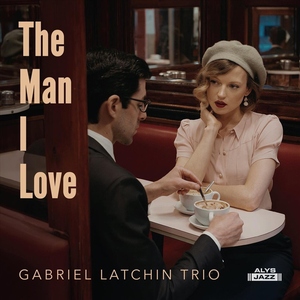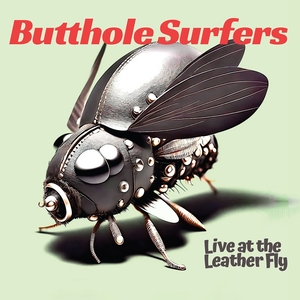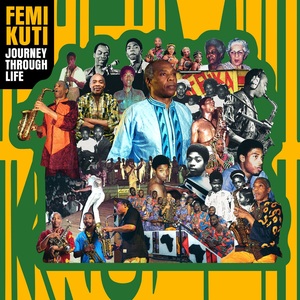Album review overview: Femi Kuti, Butthole Surfers and more
Dozens of new albums arrive at Maxazine’s editorial staff every week. There are way too many to listen to them all, let alone review them. It ensures that too many albums are left behind. And that’s a shame. That is why today we post an overview of albums that arrive at the editors in short reviews.
Gabriel Latchin Trio – The Man I Love
“Summertime.” How many versions must there be of this piece by now? The piece that George Gershwin composed in 1934 for his opera “Porgy and Bess” became especially known in Billie Holiday’s version. Thousands of versions followed, including definitely surprising renditions by Janis Joplin and “our” Brainbox with Kaz Lux and Jan Akkerman. Does a new interpretation add anything more? The Gabriel Latchin Trio tries it on “The Man I Love.” Gabriel Latchin is a versatile jazz pianist, but with the overplayed “Summertime,” the beginning of this album is certainly not promising. “The Man I Love” is an ode to Gershwin’s work, but you have to bring something special to give an original interpretation to the ten songs that are each considered “standards.” Yet Latchin succeeds in this in a few tracks. “S Wonderful” has become a delightful samba, for example, and the closing track “I’ve Got Rhythm” is, thanks to the improvisations, a highlight of the album. Latchin does an honourable service to the Gershwin legacy with “The Man I Love.” It’s especially the Latin additions, such as in the title track, that make the album worthwhile. The soporific “Embraceable You” can then be forgiven. (Jeroen Mulder) (7/10) (Gabriel Latchin Limited)
Paco Cathcart – Down on Them
In the urban landscape of New York, Paco Cathcart’s debut album under his name blooms like a delicate plant between the concrete. “Down on Them” floats between the loneliness of the metropolis and the intimate connections that make us human. The opening track, “Your Reflection” unfolds with a surprisingly subtle brass arrangement that takes the listener on a morning bicycle ride through the city. The warmth of the brass instruments contrasts beautifully with Cathcart’s thoughtful vocals, a musical dawn that heralds the rest of the album. Throughout the twelve songs, you hear the soul of an early Paul Simon. Cathcart’s approach is, like Simon’s, distinctly singer-songwriter, with emphasis on narrative lyrics and sensitive melodies in which Cathcart excels, especially when band members Elhajli, Shannon, and Wollowitz weave their voices into captivating harmonies on “Oh, Joy” and “Gender Neutral.” “Bottleneck Blues” forms the emotional highlight, where Cathcart’s poetic observations about urban suffocation and the relief at city edges strike a universal chord. This is music that invites attentive listening in a world that is always in a hurry. (Jan Vranken) (8/10) (Wharf Cat Records)
Butthole Surfers – Live at the Leather Fly
“Live at the Leather Fly” shows the Butthole Surfers in their raw, chaotic form. This archival release, recorded around their “Independent Worm Saloon” period, shows how the band sounded during their wild live performances from the early ’90s. Paul Leary’s screaming guitars and Gibby Haynes’ heavily distorted vocals together create a wall of sound that both fascinates and irritates. “Dust Devil” stands out as a rare moment where energy and structure come together – a track where the band transforms their chaotic approach into something that truly moves. What was once revolutionary, however, now sounds dated. The psychedelic excursions on tracks like “1401” and the ominous “Some Dispute Over T-Shirt Sales” are reminiscent of an experimental time that has largely lost its relevance. The punk-metal of “Edgar” still shows glimpses of why this band was once so important. These 21 tracks take you through a sound experience that mainly reminds us of how radical and innovative this music once was – and how much it’s now stuck in its era. (Anton Dupont) (5/10) (Sunset Blvd Records)
Lefty Gunplay – Can’t Get Right
In the shadow between street cred and musical failure stands Lefty Gunplay’s new album – every beat and flow proves his lack of creativity. “Can’t Get Right” is an appropriate title for an ex-prisoner whose previous albums proudly glorified the gangbanger life. After nine years in prison and his recent arrest in El Paso, Holladay’s musical freedom proves to be as limited as his freedom of movement. The album feels like a journey through a barren landscape of reheated beats and boring flows. His street experience may be real, but his music is stuck in a closed room full of clichés. “Scary Movie” is boredom in music form – a track that makes you long for silence. In the world of contemporary rap, Holladay falls short, trapped between meaningless street talk and production without innovation. Perhaps his real future lies outside the studio – the regularity of a KFC job would be a better fit than this musical failure. An album that lives up to its title: Lefty indeed can’t get it right. (Elodie Renard) (4/10) (2025 OTR Records)
Femi Kuti – Journey Through Life
In the glowing grains of African rhythms and the flowing river of political resistance, Femi Kuti’s latest work finds its home. “Journey Through Life” stands as a sonic monument – not only to the legacy of his father, Fela, but as a vibrant testimony to Femi’s decades-long musical odyssey. The record unfolds like a colourful tapestry in which the fibres of jazz, funk, and Caribbean cadences are interwoven with penetrating indictments against corruption in Nigeria. It’s music that moves both the feet and the conscience – a balance that Kuti maintains with masterful precision. In “Corruption na Stealing” and “Politics Don Expose Them,” the echo of his father’s battle cry – ‘Music is the weapon’ – resonates, but Femi’s voice is unmistakably his own. The production, entirely in his hands, creates a coherent sonic journey that breathes both historical awareness and contemporary relevance. Particularly poignant is “Chop and Run,” in which Kuti processes the notorious military raid on his father’s Kalakuta Republic in 1977 – an event that resulted in the death of his grandmother. The song forms an emotional anchor point amidst the danceable rhythms that dominate the record. The instrumental “Shotan” offers a moment of pure musical euphoria, while the epic final chord “Think My People Think” demonstrates Kuti’s ability to package political messages in irresistible grooves that prompt the listener to both dance and think. “Journey Through Life” is delightful Afrobeat, passed down through generations, but with a fresh, contemporary glow. The album proves that Femi Kuti is not merely a carrier of his father’s torch but a firestarter with his unique spark. (Jan Vranken) (8/10) (Partisan Records)










